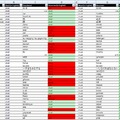Kiválló book review
http://ideamatt.blogspot.com/2007/06/some-thoughts-from-book-getting.html
- Crouch says "most people need a major overhaul, not a quick fix," which explains why most attempts to get organized don't work - the smorgasbord approach doesn't do it.
- The author says six things typically hold us back, and claims we must address all six to make progress:
- efficiently handling incoming items
- prioritizing your workload
- time management
- project management
- personality issues
- psychological issues
- The mental side of getting organized is significantly more important than anything else you do. His analogy: It's like buying a piano and thinking you can play it the next day. I like his quote about:
If you want to stay highly organized, think in terms of habit-based solutions as opposed to gadget-based ones.- He recommends a "not going to do" list, the equivalent of GTD's Someday/Maybe list. (Note: I love having clients fill these out during workshops - clients come up with some great ones.)
- He recommends we decide our most important task in the morning and do it before anything else - interruptions, email, or phone. Gina calls it your MIT (see Geek to Live: Control your workday). However, you must have a system in order to know what your MIT might be.
- His summary of how to work most effectively: stay in the moment - totally focus on what you are doing and get closure on it ... then move on to the next thing.
- He divides incoming work in to four phases: 1) gathering, 2) filtering, 3) prioritizing, 4) doing. He stresses it's important to keep them separate and do them in the proper order. (Compare to GTD's five worfklow phases: Collect, Process, Organize, Review, and Do.)
- Similarly, his equivalent to GTD's Processing & Organizing diagram is "the five decisions:" discard, delegate, take immediate action, file for follow-up, put in reference file. (For reference see How to process stuff - A comparison of TRAF, the "Four Ds", and GTD's workflow diagram.)
- I like his anti-example (what people typically do, but shouldn't): stack, stuff, spread, or any combination. I think of these as the three "Bad Ss" :-)
- He covers two GTD FAQs I see regularly: OHIO (only handle it once) and OOSOOM (out of sight, out of mind).
- Regarding reducing inputs and clutter, he has a great quote:
The things that come into your life with little or no effort will rarely go out of your life without some effort on your part. This creates a natural imbalance in your workspace and your life. Understand this imbalance and will understand that you must have a system for moving things out of your life if you want to avoid being buried in clutter.- He recommends a "control point" drawer: A hanging file within swivel distance that acts like an airport control point (reminds me of The Instant Productivity Toolkit). Things that go into it:
- Tickler file
- follow-up forms
- agenda (boss, spouse, each on-going meeting)
- casual reading (read/review)
- waiting for
- purchases/errands
- Two nice quotes on gadgets: The true test of a gadget: Is it easier than a pencil? also: Is it easier than something that is already working quite well?
- Regarding follow-up, he says there are three types of reputations of an organization: sometimes, always, or never.
- Some nice applications for the tickler file:
He says this sets expectations, which can lead to behavior changes.
- For big delegated projects put a reminder 1/2 way between now and due date.
- To manage others' follow-up skills: put a tickler 1/2 way between now and the deadline, then ask how they're doing. Move sooner or later depending on how together they are.
- I like his thoughts on meetings: He encourages us to have an agenda, but to try to learn others' perspectives - the more you know about their point of view (and they're important to your success), the more effective you will be when interacting with them.
Listen carefully to their point of view, and try to understand the beliefs that drive their behavior. It's actually a lot of fun to ask questions and try to figure out what makes them tick.- He recommends two categories for reading: have to read (use your system, or schedule time), and would like to read (use read/review and rip-and-read). This is identical to what I advise clients, but with the optional addition of a Someday/Maybe category.
- He says we shouldn't over schedule our day - More than 50% should be kept clear. Also, leave time after meetings to process &, plus leave time between meetings.
- He talks about the overloaded and confused cycle, which "stuff" worsens. Be on the lookout for anxiety and confusion; these indicate overload.
- On perfection and "too smart to start" (AKA "analysis paralysis"): Consider getting off to a chaotic start. He says many people try to get perfect at the beginning. Instead, start with an initial brainstorming session using 3x5 cards, then order by best way to start.
- For planning large projects, use a simple table with columns for: category (people, products, sources), what is to be done, who will do it, when will they do it, general comments, status (in process, completed, ...). Then: sort the table by date!
- His reasons we feel overwhelmed:
- You are setting unrealistic time frames for what you are trying to do.
- You are procrastinating too long.
- You are spending too much time working on things that do not matter.
- You are over-promising what you can do for someone.
- You do not have the profound knowledge needed to do the task.
- You do not know when and how to say No.
- He lists these causes of procrastination:
- Perfectionism - the paralyzing need to get it right the first time
- Impulsiveness - taking on too many things to do and overloading yourself
- Fear of failure - rather be seen as lacking in effort than ability
- Perception of task - seems too hard or too boring
- Uncertainty - not sure what to do
- Three things to do to master your work: Read, hang around masters, and make sure you are passionate about your job. I love his quote:
Stop making excuses and start learning more about your job than anyone else within a 100-mile radius of your workspace. When you accomplish this, move your radius out another 100 miles. Keep this up until you don.t have anymore room to expand your radius.- He makes a great point regarding "To Do" lists - most people make it too easy for things to get on the list, which means our "inputs" (work to do) exceed our "outputs" (work done). Mark Forster nails this pretty well (he calls them closed lists) - see Do It Tomorrow and Other Secrets of Time Management.
- On changing behaviors, he says anytime we encounter a new idea there are three possible outcomes: 1) nothing will happen, 2) you will alter your behavior in some minor ways, 3) the idea will significantly change your behavior and your life forever. He claims we must examine and disrupt the belief system that is driving that outcome...
- Finally, he talks about the ideas behind the work, including:
- under pressure, you act without thinking
- you can turn on the rational mind by relaxing
- if feeling part of brain is on, you default to habits (good or bad)
- if you insist on operating under pressure, you must learn good habits
- something that feels right may be bad for you (it's a habit that feels normal)
- something that feels wrong may be good for you (it's not a habit yet)



